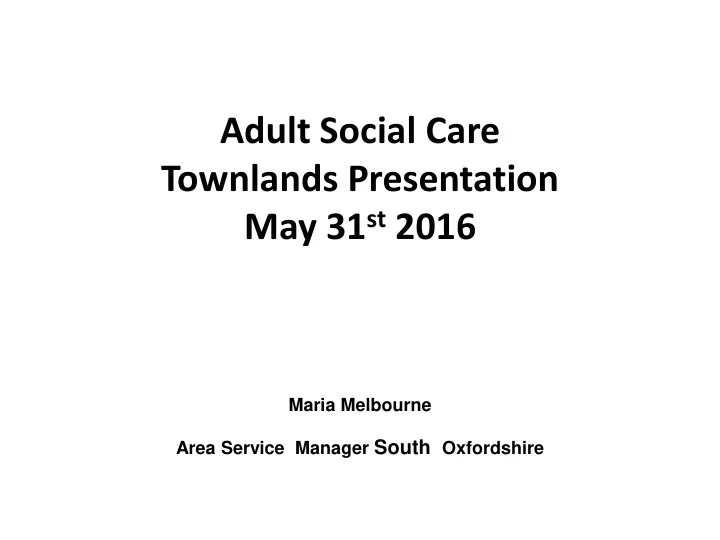

Adult Social Care Townlands Presentation May 31 st 2016 Maria Melbourne Area Service Manager South Oxfordshire
“Responsible Localities” – A new model for Adult Social Care The rising pressure on Adult Social Care due to demographic pressures. A wider range of statutory responsibilities. Modernisation of data bases and communication – agile working. The challenge of significant funding reductions. Delivering the best quality services and making best use of the skills of the workforce. We need to work in an integrated way with health, and streamlining our services is important step.
Responsible Localities • Whilst protecting services for the most vulnerable, we will proactively encouraging people to help themselves. • A cultural shift, from ‘I can fix it for you’ to ‘I will enable you to fix it for yourself’ wherever possible. • ‘Responsible Localities’ the shared health and social care vision is for services to be delivered through ‘patches’ or ‘ neighbourhood teams’, with each serving a population of 30,000 to 50,000 or 4 to 6 GP practices. • Adult Social Care teams delivery statutory responsibilities but where integrated working is required, teams will work with primary care and community services and local people, to proactively and comprehensively manage local population health and social care needs. • The intention is that Adult Social Care staff will spend more time working locally in neighbourhood patches alongside health colleagues. • ‘Responsible Localities’ the new model is planned to go live in October 2016.
Boundary Change Current Adult Locality Teams match district council boundaries. To Be October 2016. coterminous with the Clinical Commissioning Group (CCG) and Oxford Health (OH) boundaries, supporting effective working. Henley-on-Thames
Responsible Localities Teams Creation of new teams covering Adult Social Care activity including Learning Disability referrals . Workforce to include Social Workers, Occupational Therapists and Coordinators (non- registered workers). Changed response to incoming work encouraging empowerment, for individuals and their families. Working in a generic way to reduce “hand offs”.
Future functions Teams to work with all service user groups, excluding people who fall under the responsibility of Mental Health Teams It is proposed to establish six functions: 3 Rapid Response Teams 3 Integrated Locality Teams 1 Countywide Review Team 3 Acute Hospital Teams 1 Countywide Safeguarding Service 1 Countywide Service Improvement Team The number of people in each team will be reflective of team function and demands in each geographical area.
Rapid Response Teams Work closely with health to provide a same day rapid assessment and service provision for people at acute risk of hospital admission or care home placement (maximum intervention by team 6 weeks). Interface with Townlands - direct responsibility for liaison with and discharges from local community hospitals. 1 st step will be Oxford Reablement Service with further intervention from Adult Social Care as necessary Team will complete initial reviews if necessary reassessments if the person has had a change in circumstance and aim to resolve needs in 6 weeks.
Integrated Locality Teams Work with people who have longer term needs – typically, these will be people who require intensive or prolonged professional involvement. Work with GPs and health teams to form multi-disciplinary teams. Working together. Progressive development of the teams and closer joined up working. Service users will have one contact (a key worker) wherever possible. Worker Core tasks: assessments, services, initial and some annual reviews.
Countywide Review Team Responsible for all scheduled community normally annual reviews unless specific issues. Adult Social Care has a duty to review if the needs of vulnerable people and their carers are being met. We will also continue to review out of county placements. The outcome of a review could be an agreed reduction of care hours provided. So will support ‘ Help to Live at Home ’ to improve the availability and use of domiciliary care.
Acute Hospitals Responsibility for Community Hospitals – Townlands will initially be Rapid Response Teams, unless the person is already known to the Integrated Locality Team. Working with people to ensure safe and timely discharge Triage of referrals from acute settings Completion of assessments, service provision and support planning Made up of Coordinators, Social Workers, Practice Supervisors, Hospital Team Managers, led by Operations Manager
Safeguarding Expansion of current team to form a county-wide Safeguarding Service. Responsible for triaging all safeguarding queries and completing safeguarding investigations unless a person is well known to the Integrated Locality Team (open and active for 12 weeks or more). Made up of Social Workers, Occupational Therapists, Practice Supervisors, a Team and Operations Manager.
Henley postcode statistics • Raw statistics over a 12 month period approximated 204 referrals covering a range of needs and many already known to Adult Social Care. • Average referral rates 17 per month varying needs and small % related to hospital admission. • Care packages provided in 1 year totalled 60. • 60+% of referrals are for an occupational therapy assessment .
Work flow • Preventative work in the community delaying need for services. Supported by Rapid Response or Integrated Locality Team depending on need, increasing independence plus avoiding hospital admission unless acute clinical need. • RACU assess unplanned changes. • Discharges from acute hospitals or IBC beds Adult Social Care working with Health, Housing and Voluntary Agencies to respond to need and empowering people.
We need to be flexible to meet assessment needs. A coordinator will link into the RACU but subject to need it could be a social worker or occupational therapist. • Any Questions?
Recommend
More recommend